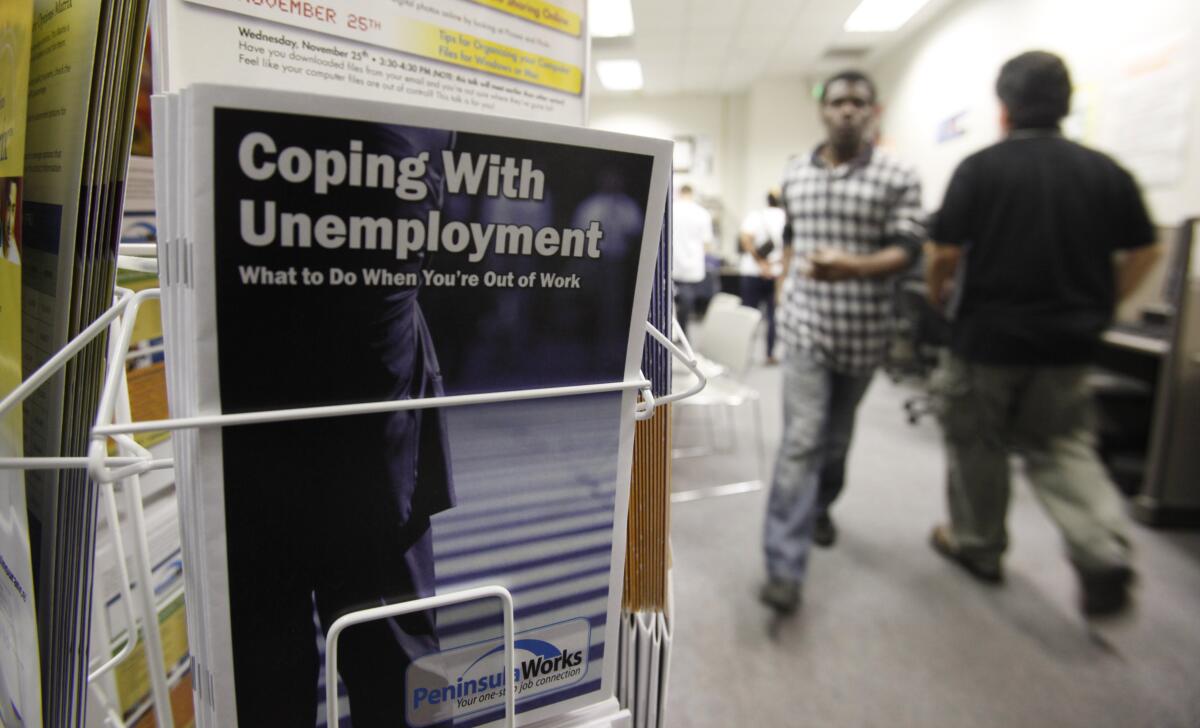California unemployment agency director to retire after months of delayed jobless benefits

Under fire for delays in paying unemployment benefits to more than 1 million Californians during the COVID-19 pandemic, Sharon Hilliard said Friday that she is retiring as director of the state Employment Development Department.
Hilliard, 56, has received strong criticism from jobless Californians and state lawmakers in recent months as technology problems and bureaucratic tangles caused a backlog of 1.6 million claims for unemployment benefits, many months old. She said she will retire effective Dec. 31 after nearly four decades in state government.
“It has been my privilege to be part of the Employment Development Department team since the day I walked into the EDD building over 37 years ago,” Hilliard said in an email to EDD employees. “This past year I have been committed to seeing the EDD through the most challenging times in the Department’s history, but I believe I can now retire knowing that the EDD is on a great path to success.”
The resignation comes nearly three months after 61 state lawmakers, a majority of the California Legislature, wrote a letter to Gov. Gavin Newsom calling for immediate action to fix EDD problems that have kept hundreds of thousands of jobless Californians from getting any financial assistance for months after they were thrown out of work.
“We’ve waited months for EDD to provide a roadmap out of this crisis, but none has been forthcoming,” said the Aug. 5 letter.
In response to widespread criticism, Newsom created a “strike team” of technology experts that in September recommended an overhaul of the agency’s computer systems and operations. EDD officials said that recent changes allowing faster verification of identities has helped reduce the backlog by hundreds of thousands of people.
Republican Assemblyman Jim Patterson of Fresno had called recently for Hilliard to be replaced as director.
“This director has misled the public, the governor, the media and Legislators,” he said in a recent statement. “It’s time she was replaced with someone who can help us create the EDD of the 21st century. We need change at the top, and we need it now.”
On Friday, Assemblyman David Chiu (D-San Francisco), a leading critic of the EDD, welcomed the announcement that Hilliard is leaving.
“I’m not naive that the director’s retirement will magically change EDD’s resistance to reform, but I strongly hope that a change in top leadership will lead to a more dynamic and responsive agency,” Chiu said after Hilliard’s announcement.
Newsom’s office said that a statewide search would be conducted to find a replacement for Hilliard, who the office said was planning on retiring when she took the position.
“We thank her for her many years of service to the state,” said Erin Mellon, a spokeswoman for Gov. Gavin Newsom’s office.
Earlier in the day, the governor said that he is aware of continuing problems with the unemployment benefits system and that his office is working to resolve the problems.
“We are not ideological about how we do that,” Newsom said during a news conference. “We are very cognizant about the need not only to address the situational challenge but also address the medium- and long-term challenges, to once and for all fix the EDD, which I assure you is underway.”
Newsom appointed Hilliard on Feb. 11 as director of the agency for which she had worked in various positions since 1983, when she started with an entry-level position at age 19. Before she headed the EDD, she served as the agency’s chief deputy director and was acting director for 14 months before then-Gov. Jerry Brown appointed Patrick Henning Jr., a former top staff member to the governor, in 2014.
She also previously worked at the EDD as deputy director of the tax branch, chief of the field audit and compliance division, chief of the tax processing and accounting division, chief of central operations and chief of underground economy operations.
The director’s position included an annual salary of $199,056.
The vast department, with more than 8,000 employees, runs the state’s unemployment and disability insurance programs and labor statistics services, oversees paid family leave laws, and collects a variety of payroll taxes.
The agency has repeatedly faced criticism for its practices. Last year, the state auditor recommended that the EDD stop sending Social Security numbers out in letters to claimants because of the risk of identity theft.
During Hilliard’s stint as acting director six years ago, glitches in the EDD’s computer system delayed payments to some 300,000 unemployed Californians, while problems with the agency’s phone line led to claimants failing to connect with caseworkers in 9 out of every 10 attempts.
Similar problems emerged in March after Newsom ordered Californians to stay at home to stop the spread of COVID-19.
In recent months, jobless Californians have complained of calling the EDD hundreds of times a day without reaching a live service representative. When they did get through, many callers reported, they were sometimes disconnected by caseworkers who could not resolve problems that were stalling their claims.
EDD workers told The Times recently that their efforts to process claims have been hampered by outdated technology, bureaucratic red tape and a shortage of trained, experienced staff members.
The agency proposed two projects in 2003 to modernize access to its unemployment insurance services at a total cost of $96 million, the independent Legislative Analyst’s Office said in a report years later.
The project included upgrading the EDD’s call centers and call routing system, and automating the claims process for customers, but it faced delays that pushed its original 2008 completion schedule back at least four years as costs swelled.
“Total costs went from an original $96 million to $159 million,” the analysts reported.
Before that work could be completed, glitches in the agency’s technology caused delays of a month or more for benefit checks to an estimated 117,000 Californians in 2009, The Times reported then.
Times staff writer Taryn Luna contributed to this report.
More to Read
Start your day right
Sign up for Essential California for news, features and recommendations from the L.A. Times and beyond in your inbox six days a week.
You may occasionally receive promotional content from the Los Angeles Times.







